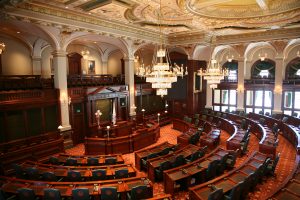Illinois lawmakers end term with a handful of nothing for schools
By Jean Lotus Staff Reporter — June 4, 2016
The Illinois General Assembly ended its legislative session without passing a budget or an emergency funding bill for education.
There are plenty of fingers to point and plenty of blame to spread around as the
The Illinois General Assembly ended its legislative session after midnight June 1 without passing a budget, or even passing an emergency funding bill that would allow K-12 schools to open in the fall.
A Democrat-proposed budget bill and an education stop-gap bill both died on the last day of the legislative session when they could have passed with a simple majority.
“To give the General Assembly a grade of F would be too generous,” said State Rep. Bill Mitchell, (R-Mahomet ) June 1. “Public education is a state responsibility,” he said. “The most elementary job we have is to pass a budget. We did not do that and we had plenty of time to do it.”
Supermajority Democrats, under the leadership of House Speaker Michael Madigan and State Senate president John Cullerton rolled out two last-minute spending proposals: a state budget and a school funding stopgap bill. By midnight May 31 both bills had failed.
The $39 billion budget bill (SB 2048) was defeated in the Senate, 31-17. Two weeks earlier, in the House, the bill was criticized as a rush-job: Five-hundred pages long, it was delivered to lawmakers two hours before the vote and with more than $7 billion in deficit spending. It was crammed through the House, 63- 51, with one House member voting present. Republicans howled the budget was “phony.”
“I’m prepared to negotiate with the governor to find the money,” Madigan said afterward in an interview. “My first choice would be taxing the wealthy.”
But by the last night of the session, some Democrat state senators were chafing at leadership and voted with their Republican colleagues against the last-minute budget.
Democrats who stepped out of line and voted “no” were: Scott Bennett (Champaign), Melinda Bush (Grayslake), William Haine (Alton), Napoleon Harris III (Flossmoor), David Koehler (Peoria), Andy Manar (Bunker Hill), Julie Morrison (Deerfield), Laura Murphy (Park Ridge), Michael Noland (Elgin), Steve Stadelman (Rockford) and Heather Steans and Patricia Van Pelt (Chicago).
Republicans called the Democratic revolt “chaos,” but Cullerton explained the Democrats were reacting to Gov. Rauner’s veto threats. “[They were in chaos] by not passing a bill [Rauner] said he was going to veto? If he vetoed it, we’d be right where we are now,” Cullterton said in a late-night press conference May 31.
The last-minute K-12 stop-gap funding bill was also shot down, this time in the House. The $900 million HB 2990 proposal would have given $475 million to Chicago Public Schools.
In contrast, Rauner’s proposed education budget (SB 3434 allotted more money for schools throughout the state, but CPS funding was cut by $74 million. The Republican schools alternative was not tied to elements of the governor’s “Turnaround Agenda” such as reform of worker compensation laws or making Illinois a Right to Work state.
“Democrats refused to call Senate Bill 3434, which would have ended proration by fully funding schools and made sure that no school lost money,” said Sen. Jason Barckman (R-Bloomington) in a statement. “Instead they rammed through a bill that will never become law, a bill that would attempt to spend $900 million that the state simply doesn’t have.”
“I don’t know how we can talk realistically about adding that amount of funding when there are so many other critical services that we can’t fund,” said Senate Republican Leader Christine Radogno before the vote.
The Senate passed the education bill, but it failed in the House around midnight May 31, 92-24. The governor’s alternative bill never saw the light of day, and the General Assembly ended up with no plan.
In the following days state and education leaders realized this stalemate meant no state money budgeted for any Illinois elementary and high schools.
Chicago Public School CEO Forrest Claypool announced June 2 that unless funding was settled by July, CPS schools wouldn’t open in the fall. The Chicago school district’s credit rating is at “junk bond” status and the district is unable to borrow money for operating expenses. Claypool said he thought many other schools would be in the same situation with only 30-90 days worth of operating expenses in reserve.
After the legislative sessions ended, Rauner visited school districts around the state telling school leaders the Democratic leadership had “put a brick on” school funding.
“[Michael Madigan] doesn’t want schools to get funded this fall unless Chicago gets a massive bailout,” Rauner said June 1 to an audience of Mahomet downstate school personnel. “This is wrong. They’re going to hold our schools hostage.”
Rauner accused Democratic state leaders of postponing a vote on the budget until the January session. That would be after the Nov. 8 elections, when the Democrats could pick up a few seats. The governor and Democrats have promised to work together to craft a “Grand Bargain” but neither side appears to want to budge.
State legislators tried to explain to their constituents in letters and statements on their websites.
“Along with funding education we have a responsibility to keep the promises we have made to fund social services and countless other entities in our state,” said Karen McConnaughay (R-St. Charles) in a statement.
“Currently, there are working groups that are making progress in Springfield,” wrote State Rep. Stephanie Kifowit (D-Oswego) to voters in her district. “Passing short-term stopgap funding measures is not a permanent solution to move our state forward. Instead, we must pass a fair and responsible budget to correct the damage from last year and create a better future for Illinois by fully funding our schools and universities, providing services for our seniors, veterans, and individuals with disabilities, and promoting job growth.”
Madigan said he would continue to hold sessions in the House on Wednesdays through the summer. Rauner has said he would try to get more sessions to keep lawmakers on track.
—
Illinois lawmakers end term with a handful of nothing for schools —









